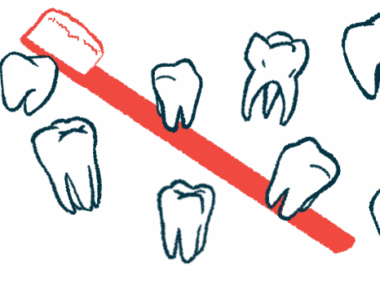Implant-supported overdentures may boost life quality for Sjögren’s patients
Ability to chew food improved with implant-supported overdentures
Written by |

In adults with Sjögren’s syndrome with missing teeth, implant-supported overdentures — which are removable dentures that rest on implants — may improve the ability to chew, potentially leading to better quality of life, a study has found.
The study, “Implant supported overdentures in Sjögren’s disease patients: a multicentre prospective cohort study,” was conducted by researchers in the Netherlands, and published in Clinical and Experimental Rheumatology.
Sjögren’s syndrome is a chronic autoimmune disorder that mainly affects the glands that produce tears and saliva. The most common symptoms are dryness in the eyes and mouth.
Because saliva protects teeth from decay, “a lack of saliva subsequently increases caries [tooth decay] risk, which results in progressive degradation of the dentition and, in the end, a need to replace missing teeth,” the researchers wrote.
Lack of saliva due to Sjögren’s makes it difficult to wear conventional dentures
The lack of saliva also makes it difficult to wear dentures and to keep them from falling out. For people with Sjögren’s syndrome, an implant-supported overdenture could be a better treatment option, according to the researchers.
Dental implants are screw-like posts that are surgically implanted into the jaw to provide support for artificial teeth, such as overdentures. These can help restore a person’s ability to chew as well as improve satisfaction with aesthetics.
In the study, researchers compared patient-reported and clinical outcomes between people with Sjögren’s syndrome and those without the disease who received implant-supported overdentures.
The study (NCT02661243) included 51 implants in 12 adults with Sjögren’s syndrome, mean age of 66.3, and 50 implants in 12 adults without the disease, mean age 62.8. All had one or more missing teeth in the upper or lower jaw.
Assessments were conducted at baseline (the start of the study) and at one, six, 12, and 18 months after the overdentures were fitted.
The ability to chew soft and tough food improved significantly at all time points compared to baseline in people with Sjögren’s syndrome. In people without the disease, significant improvements were observed for soft, tough, and hard food.
However, the ability to chew tough and hard food was significantly better for people without Sjögren’s syndrome than for those with the disease at all timepoints after the overdentures were fitted.
Oral-related quality of life was assessed using the Oral Health Impact Profile-14 (OHIP-14), a questionnaire that covers aspects such as physical limitation and pain. The total score ranges from zero to 56, with lower scores indicating better quality of life.
At baseline, mean OHIP-14 scores were higher in people with Sjögren’s syndrome than in controls (41.3 vs. 36.5 points). While the difference was not significant, it was greater than five points, thus crossing the cutoff value defined as clinically relevant.
Both groups show significant improvements in health-related quality of life
At 18 months after the overdentures were fitted, both groups showed significant improvements in oral health-related quality of life. The mean OHIP-14 scores dropped to 25.2 in Sjögren’s patients and to 15.9 points in people without the disease.
Implant survival, defined as the percentage of implants initially placed that remained fixed and did not feel loose, was 100% in people with Sjögren’s syndrome and 98% in those without the disease.
X-ray images revealed marginal bone loss around dental implants did not differ significantly between the two groups (1.12 vs. 1.43 millimeters). Plaque, bleeding, and gum health were also similar in the two groups.
“Clinical performance was good with no differences between the groups for all outcome measures,” the researchers wrote, noting implant-supported overdentures “can be successfully applied” in people with Sjögren’s syndrome.







